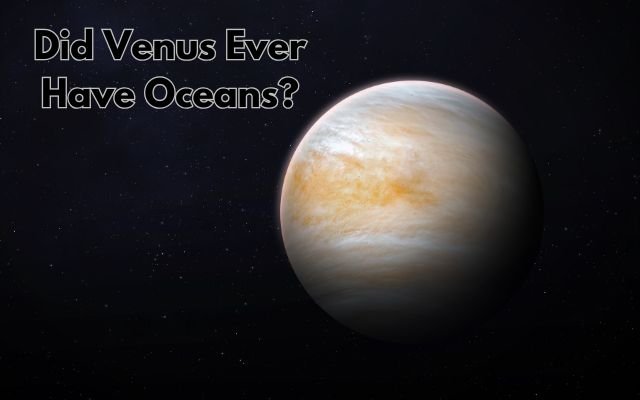Did Venus Ever Have Oceans?
Did Venus ever have oceans? Explore the mysteries of Venus' past and the possibility of ancient oceans on the planet.

Venus, our nearest space neighbor, is sometimes referred to be Earth’s “twin” due to its similar size. However, Venus and Earth are actually extremely different. The temperature is so high that metal can melt. In addition, the planet possesses high pressure and dense clouds composed of dangerous gasses. Scientists have long questioned whether Venus ever had oceans and temperatures closer to Earth. But according to recent studies, Venus has most likely never had oceans & has been dry for the majority of its existence. Did Venus Ever Have Oceans? Recent findings point to no oceans ever existing on Venus.
The Extreme Conditions on Venus
Venus is a harsh place these days. At over 460°C (860°F), the surface temperature is hotter than that of Mercury, the planet nearest to the Sun. In a runaway greenhouse effect, Venus’s dense atmosphere holds heat even though it is further from the Sun than Earth. Carbon dioxide makes up majority of the air, whereas sulfuric acid makes up the clouds. Similar to the pressure observed 900 meters (3,000 feet) below the surface of Earth, pressure on Venus is 92 times greater than that on Earth.
Venus’s harsh environment makes life there all but impossible. For a long time scientists believed that Venus might have had a milder climate with oceans of liquid water, similar to Earth. Models that suggested Venus was cooler before volcanic activity caused planet to become extremely hot gave rise to this theory. However, recent research is now casting doubt on this notion.
Two Competing Theories About Venus’s Past
The two primary theories regarding Venus’s history are that it has always been too hot for water and that it once had oceans.
The first theory says that Venus once had oceans covering its surface to a depth of about 500 meters (1,640 feet). According to this theory, volcanoes erupted on Venus and released large amounts of greenhouse gases like carbon dioxide into the atmosphere. As a result, oceans evaporated into the air and temperature rose sharply. The planet we see today is hot and dry because the water eventually went into space.
According to second theory, Venus has never had enough heat for liquid water to exist. Any water vapor in the atmosphere would have swiftly gone into space, therefore Venus, from this perspective, never had oceans. Stated differently, Venus has always been the harsh, inhospitable planet that it is today.
Both theories have been widely discussed in the scientific community. Based on recent data from Venus’ atmosphere, new study is providing an alternative viewpoint, though, under direction of Tereza Constantinou, a PhD candidate from University of Cambridge. This paper makes the case that Venus’ interior has probably been dry throughout its history, casting doubt on the notion that planet ever had oceans.
Research and Its Findings
The scientific team, under the direction of Constantinou, investigated Venus’s past in a novel way. The scientists looked to the planet’s current atmosphere to learn about its past rather than depending on computer models that can only speculate about what may have happened in the past. They concentrated on the chemical makeup of Venus’ atmosphere, which is mostly the consequence of millions of years of volcanic activity. Volcanoes emit gasses that reveal information about the planet’s internal processes.
The team looked at how gases like water, carbon dioxide, and carbonyl sulfide are destroyed in the atmosphere and how they interact with Venus’s surface. They were able to understand more about conditions inside Venus & planet’s volcanic past by examining these chemical interactions.
Only roughly 6% of Venus’ volcanic emissions are water according to research. Compared to what would have been required for Venus to have formerly had vast oceans, this is negligible quantity. This implies that the planet’s interior has never been sufficiently dry to allow for the substantial outflow of water to surface. Consequently, it’s likely that Venus never had oceans.
Constantinou clarified that since life depends on liquid water, it is hard to think Venus could ever support life as we know it without seas. Assumption that Venus has always been a hot, dry planet without seas to cool it down is supported by this research.
Criticism and Other Views
Not everyone agrees with the conclusions of Constantinou’s team. Some scientists, like James Holmes from the Open University, believe that there are still many uncertainties about Venus that could affect the study’s findings. For example, the team’s calculations might be based on incomplete data about the composition of Venus’s deep atmosphere. More information on the current rate of volcanic activity could also change the conclusions.
Richard Ghail, a researcher from the University of London, raised concerns about the team’s assumptions. He questioned whether the researchers had correctly calculated how chemicals like carbonyl sulfide and carbon dioxide are deposited on Venus’s surface. If they overestimated the amount of these gases in the crust, the amount of water in Venus’s atmosphere could be higher than the study suggests. Ghail also noted that the sulfur cycle on Venus, which is the disintegration of sulfur-rich materials, may have a greater effect on the atmosphere of the planet than initially thought.
In spite of these objections, the study’s team maintains their conclusions. They acknowledge that much remains to be discovered about Venus and that more data from future missions may confirm or refute their findings.
Future of Venus Exploration
Understanding Venus is only a little bit closer thanks to this study. Although we still don’t fully understand planet’s past, scientists are optimistic that future space missions will shed more light on the matter. For example DAVINCI mission will investigate Venus’ atmosphere, while NASA’s VERITAS mission will survey the planet’s surface in great detail. Furthermore, new information about the planet’s geology and its historical changes will be revealed by European Space Agency’s EnVISION project.
We will be able to determine if Venus had oceans in past or if it has always been scorching, arid planet that we see now thanks to these missions. This question may ultimately be answered by scientists with greater data.
Why Venus Matters
Studying Venus is important for search for life on other planets as well as for comprehending our nearest neighbor. We can learn more about how planets change & what circumstances are required for life to originate by studying Venus’s past. Even though Venus is harsh & uninhabitable, scientists researching exoplanets—planets that orbit other stars—can learn a lot from it.
“Venus offers us a unique opportunity to explore a planet that evolved very differently from ours, right at the edge of the habitable zone,” as Constantinou has stated. We can learn more about what makes a planet habitable & what happens when those conditions shift too much by studying Venus’s past.
- ISS Leak Threatens Astronauts, NASA Warns of Catastrophe
- ISRO Successfully Launches Proba-3 Satellites: A Milestone in Space Collaboration
- Rethinking the Pluto Problem: Time for a New Definition of a Planet?
Conclusion
Although there is still much disagreement over whether Venus ever had oceans, the latest study from the University of Cambridge broadens our knowledge of the planet. Team theorizes that Venus has never supported life because of its arid interior & sparse atmospheric water. This study emphasizes significance of Venus in understanding evolution of planets & conditions required for life to exist even though further missions will be required to validate these conclusions. Story of Venus is still crucial to hunt for extraterrestrial life even though it may not have been Earth-like planet we once thought it was.



